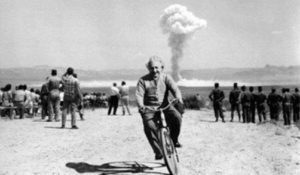


Talk to anyone in the industry and the term you will hear the most is nuclear verdicts. Insurance companies and motor carriers are terrified of them and risk adversity is causing defensible cases to be settled.
WHY THEY HAPPEN?
There are many contributing factors that can lead to a nuclear verdict. I outline some below and these may come as harsh truths.
- Lack of safety/risk management viewed through a litigation lens.
- Lack of appreciation for the power differential between the Plaintiff Attorney side of the “versus’ and the Defense Counsel side.
- Lack of due diligence in defense counsel selection.
- Lack of knowledge and trial exposure on the part of the decision makers (Not knowing what you do not know).
- Knowing all aspects of your venue.
- Lack of appreciation for the nuances of the case (which cannot be written in a 5 sentence executive summary).
HOW TO AVOID ONE
1.Proactive internal programs before the accident happens:
- Attorney discussions with drivers and mechanics about:
- The “why” of rules they are asked to follow with deposition clips of what happens when they do not.
- How drivers social media will hurt them after an accident and for future employment opportunities. You cannot tell them not to post but you can give them a “reason” not to post.
- Counter intelligence operations to test the companies litigation vulnerabilities.
- Selection of key personnel with an eye not just toward knowledge and experience, but also how they will present in a deposition and at trial.
- Use of on board cameras and drive assist programing.
- Doing a proper role out of an onboard camera program as drivers can be paranoid about them.
- Elaborating on the three year accident record to put an accident in the most favorable and truthful light to take the sting off the list when in deposition or trial.
- A litigation drilldown on your safety manual to see where it will hang you in deposition. Revise it now, not after being tortured in deposition on a bad case. The concept of preventability being misused as a fault finding on the part of the driver due to confusion of its meaning and not correctly delineating it in a safety manual.
- If you broker loads:
- Review your contracts for not just for additional insured language but also properly worded indemnity provisions that really protect you and give you choice of counsel. This is so you do not get saddled with defense counsel hired by a carrier who does not have any skin in “your game”. Particularly important if the contractor’s carrier has tendered its limits.
- Ensuring receipt of additional insured certificates and make sure your contract gets into the hands of the contractor’s insurance agent.
- Review your screening procedures.
- Is your brokering operation separate and stand alone from your own motor carrier operations and insurance.
These are just some of the things that will not only help avoid a nuclear verdict, but would help on loss ratios at renewal time or when deciding how much of an SIR or deductible to have.
2. Education about the Plaintiff Attorney’s approach and why it is vastly superior to the present defense paradigm.
- Plaintiff Attorneys report to only one person or family who usually trusts them completely.
- It costs them very little to do a scorched earth policy in the pretrial stage. Plus they know defense costs are the hot button for insurance companies and motor carriers.
- Current philosophy is that carriers cannot control verdicts, but they can control settlements and cut costs for defense by way of the cheapest hourly rate and unrealistic litigation guidelines and audits that weaken Defense Counsel.
- Did you know that carriers follow the guidance of 18 Metrics and 22 Key Performance Indicators (KPIs) in running their companies. Not one of the Metrics or KPIs have anything to do with quality of defense counsel, plaintiff counsel or success at trial. The only mention of counsel is in expense control. Plaintiff Attorneys have only one metric…WINNING. A good friend and president of a trucking company once put it best, “The carriers are stepping over Benjamins to save some dimes”.
- Plaintiff Attorneys will pull out all the plugs because their payday is a variable that increases with every extra effort such as:
- mock juries,
- inviting as many other plaintiff counsel as they need to assist at trial with a simple split of the contingency fee,
- a jury consultant to form questions,
- an army of paralegals doing in-depth juror investigation during voir dire.
3. How did you get your defense counsel:
- There are plenty of defense firms that can “handle” cases, but have not tried cases to juries. There are a number of “legal networking organizations” that charge hefty dues for firms to join with little to no screening for trial experience. Glad handing at a happy hour or getting wined and dined is not due diligence in counsel selection. One such organization literally only has one firm for the entire State of Texas…I think it was Henry Ford who said “You can have any color Model-T Ford as long as it is black”.
- Trial lawyers with actual trial experience are becoming an endangered species. What should you look for in an attorney/firm to have done your due diligence?
- Board Certification
- A complete trial list upon request
- Depth
- References from both risk managers, claims personnel and insureds
- Familiarity with the judges in the area
- Knowledge of the demographic population and jury pools
- Providing consistent and reliable legal services to carriers and their insureds in all relevant counties
- Actual and deep experience with 24hr. emergency response for accident investigation
- Adequate E&O limits ($5 million)
- Independently do a LexisNexis verdict search on your counsel.
- Significant cases should have appellate counsel present at trial for preservation of error (especially in an adverse venue and or with a plaintiff oriented judge).
4. Educate yourself as to the specifics of trial and how it works. Have you ever actually sat through a significant trial from beginning to end? If not, you may not completely understand:
- The significance of pretrial rulings, how they are made (difference between a Motion in Limine versus a Motion to Preclude).
- The jury selection process and how good and bad jurors end up on a jury. (I once had a case where the Plaintiff Attorney was able to bust 2 jury panels because the conservative jurors answered enough questions to disqualify themselves for cause that it left less than 24 potential jurors. Not enough for the 12 preemptory challenges [6 per side] and still have 12 jurors. When asked by the claims management what happened, I said the jury panel was too conservative, to which came back the question “How can a jury be too conservative…?”. Enough said.)
- Whether or not to bifurcate the trial of punitive damages.
- Should there be a jury shuffle.
- The significance of the plaintiff attorney putting on all the defendant’s witnesses first or the jury charge and how it can be manipulated to your advantage or disadvantage.
- The possibility that favorable evidence may become inadmissible and rendered moot by a strategic non-suit of specific claims.
- The possible benefit of a high/low agreement for the case that cannot be settled outright.
Are you the best person to make the decision on whether to settle or go to trial? If you have not educated yourself, then maybe more input is needed. By way of example, I once attended a financial planner’s luncheon where he was courting prospective clients. He told a story about one person he approached about doing his financial planning and investing in the stock market. The prospect asked the planner if he was the best person bar none to pick stocks. The planner had to candidly say no he was not. The planner now has someone else do his stock picking for his clients.
5. Know the venue issues of your case:
- Who is your judge?
- Do they allow full voir dire or only 20 minutes?
- Is their reputation to let all the evidence in or carefully consider the legal issues?
- Are they consistent. erratic, plaintiff oriented…?
- Do they know the Plaintiff Attorney and how well.
- Do you need Local Counsel? In the right cases, it is money well spent.
- How small is the county and does everyone already know about the case?
- Does the company, driver and/or plaintiff have a presence in that locality?
6. Appreciate the nuances of each case. Every case has a nuance or nuances and no two cases are the same. They can be good for you or they can be bad for you.
- What is a nuance?
- How relatable is your driver?
- Does the plaintiff have a “flakey vibe”?
- Is a family member suing a family member, i.e. unauthorized passenger or team drivers
- Does the trucking company do community outreach in the area?
- How well can defense counsel personalize himself or herself in Voir Dire while emotionally preparing the panel for the negatives in the case? (Voir Dire wins or loses the case….)
- Is defense counsel able to be personable in contrast to a Plaintiff Attorney that is caustic or rough on defense witnesses.
- Do you have impeachment of which the plaintiff attorney is unaware? i.e.:
- The police report shows the Plaintiff’s license has a corrective lenses endorsement with no contacts listed in the autopsy and no glasses documented at scene by police with an accident that happened in the fog.
- Widow denies she was separated from the deceased and were getting back together, yet did not file suit in her home county which is also where the accident happened.
- Girlfriend who claimed common law marriage with the deceased, but despite prolific social media posts, fails to mention it until after the fatality accident.
- Timelines, Timelines, Timelines: They can be devastating on any number of issues and show a cynical side to the plaintiff.
- Do you have reconstruction that will set up the case theme that jurors can relate to?
- Is a critical witness particularly relatable to the potential jury pool because of any number of factors such as race, being locally known or very credible demeanor.
- If there were drugs in the plaintiff’s system, what type?? Marijuana has minimal studies on its quantifiable impairment effect on the body. Admissibility fight…
My observations are based on experience. Experience provides the “backstop” for the claims department and the motor carrier. By way of example, I’ve tried 75 jury trials to verdict in 35 years, including 6 death cases and serious injury cases. Having a Board Certification in Personal Injury Trial law and actually trying cases means real experience. This level of experience is becoming the exception rather than the norm.
Obviously not every case should be tried. That is where judgement comes in. However, true experience is also essential to getting good settlements. For example, in mediation, a good philosophy was best expressed by Harry Truman, “If you are going to tell someone to go to hell, you better have the power to send them there”. Thus, the other side knowing you will go the distance will make them more realistic. This is especially true when your reputation is known in the legal community.

